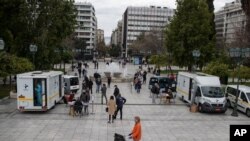Illegal migrants and refugees in Greece will take a back seat in the nation’s coronavirus vaccination drive, the government in Athens has said, stoking concerns that more than 70,000 asylum-seekers, stuck in squalid living conditions, may become more vulnerable, according to aid workers and the United Nations.
In rolling out the vaccine program last month, the center-right government of Kyriakos Mitsotakis vowed to make asylum-seekers eligible for the jab.
But Aristotelia Peloni, a government spokesperson, said this past week that thousands of migrants and refugees stuck in some 30 camps across the country or left adrift without proper accommodation, waiting for years to have their asylum requests heard, were not a priority.
“There is a provision for [migrant] inoculations to take place in closed areas, but for the time being others have priority, mainly elders … and vulnerable groups that will soon be added into the program regardless of age,” she told a news conference.
As of February 1, only the Netherlands and Spain have included migrants into their vaccination programs, according to the Platform for International Cooperation on Undocumented Migrants (PICUM). Britain also offers free coronavirus testing and vaccinations for undocumented migrants. And Germany, most recently, said migrants would be second in line in its ongoing vaccination drive.
People older than age 85 have led Greece’s vaccination campaign, including senior government officials, health workers, police, coast guard personnel and the military. Jabs for those 60 and older have followed in recent weeks in a second and third wave of inoculation against the deadly virus that causes the COVID-19 disease.
But the government’s “Greeks first” vaccination policy has critics here fearing it echoes strong anti-immigrant sentiment and rhetoric once trumpeted by the leaders of Golden Dawn, one of Europe’s most violent neo-Nazi groups.
Humanitarian organizations, including the United Nations’ refugee agency, UNHCR, are urging the government to clarify its policy regarding migrants.
“No one is safe until everyone is safe,” said Peter Kessler, the senior communications officer for the U.N.’s agency in Greece. “Ensuring that refugees and other non-nationals are included in the vaccine rollout and have access to vaccinations is key to protecting everyone and ending the pandemic.”
At least 70% of the population worldwide needs immunity to "sustainably slow the transmission of the virus." And key to ending the pandemic, experts say, is ensuring that refugees are included in the vaccine rollout.
Since taking power in 2019, Mitsotakis’s center-right government has adopted a tougher stance on illegal migration, coming under increasing fire by aid organizations and the UNHCR for mistreating migrants and refugees, and by orchestrating covert operations to forcibly evict asylum-seekers.
In a report issued last month, aid group Aegean Boat Report documented the cases of 13 men, women and children it says were beaten, robbed and forced onto a life raft by Greek authorities on the island of Lesbos, only hours after illegally entering the country from Turkey.
The report said uniformed operatives removed the refugees from a camp on the island, claiming the refugees were being taken for COVID-19 testing.
“Instead,” the report said, “they were forced into an isobox, repeatedly beaten with batons, stripped of their possessions and forced into seas on an inflatable raft.”
Greece has grappled with accusations of forced migrant returns and abuse since 2015, when about a million refugees, mainly from Syria, Afghanistan and Iraq, arrived in Europe to escape violence at home.
Forcing migrants to turn around is a serious breach of international law, violating asylum-seekers’ right to safe passage and protection.
Croatia, France, Spain, and Italy — all European Union member states that face similar migration challenges — also have been accused of engaging in unlawful, sometimes violent pushbacks.
Officials contacted by VOA on Sunday did not respond to requests for comment. Still, the government in Athens has repeatedly denied the allegations, claiming humanitarian groups have been aiding and abetting asylum-seekers in their quest to illegally enter Greece from Turkey and seek passage to the heart of Europe. Athens has also alleged that several of the non-governmental organizations have been working with human smugglers, allegedly facilitating illegal migration to Europe.
In February, NGO Mare Liberum said it alone had documented “close to 10,000 people” who were pushed back in 320 cases last year.
The group said the alleged pushbacks represented an “unprecedented escalation in human rights violations in the Aegean.”
